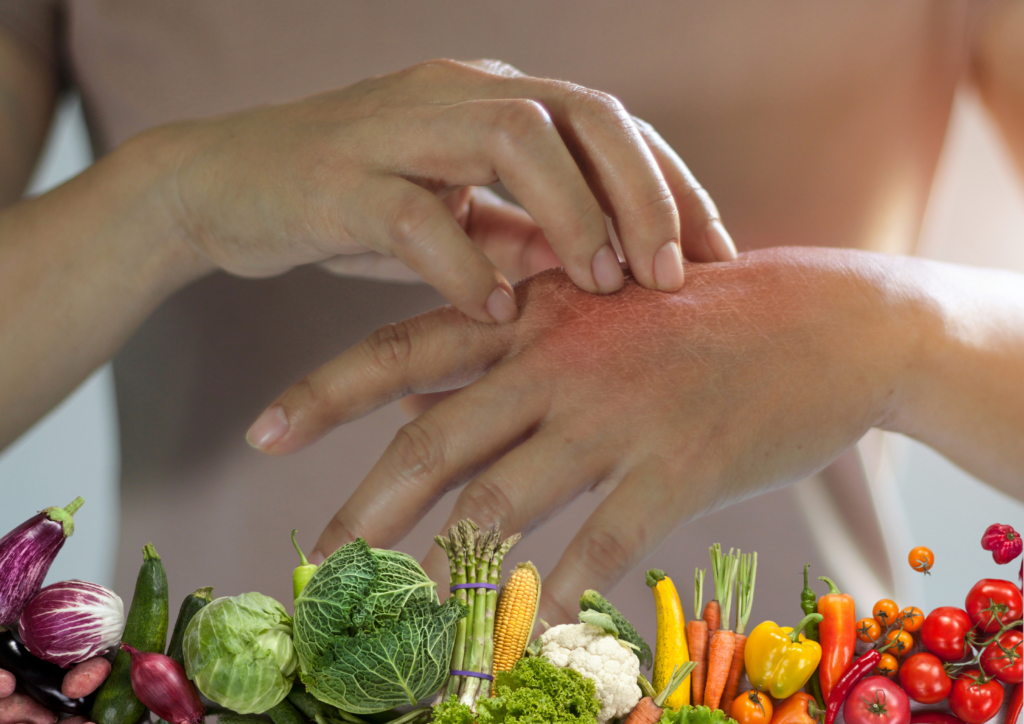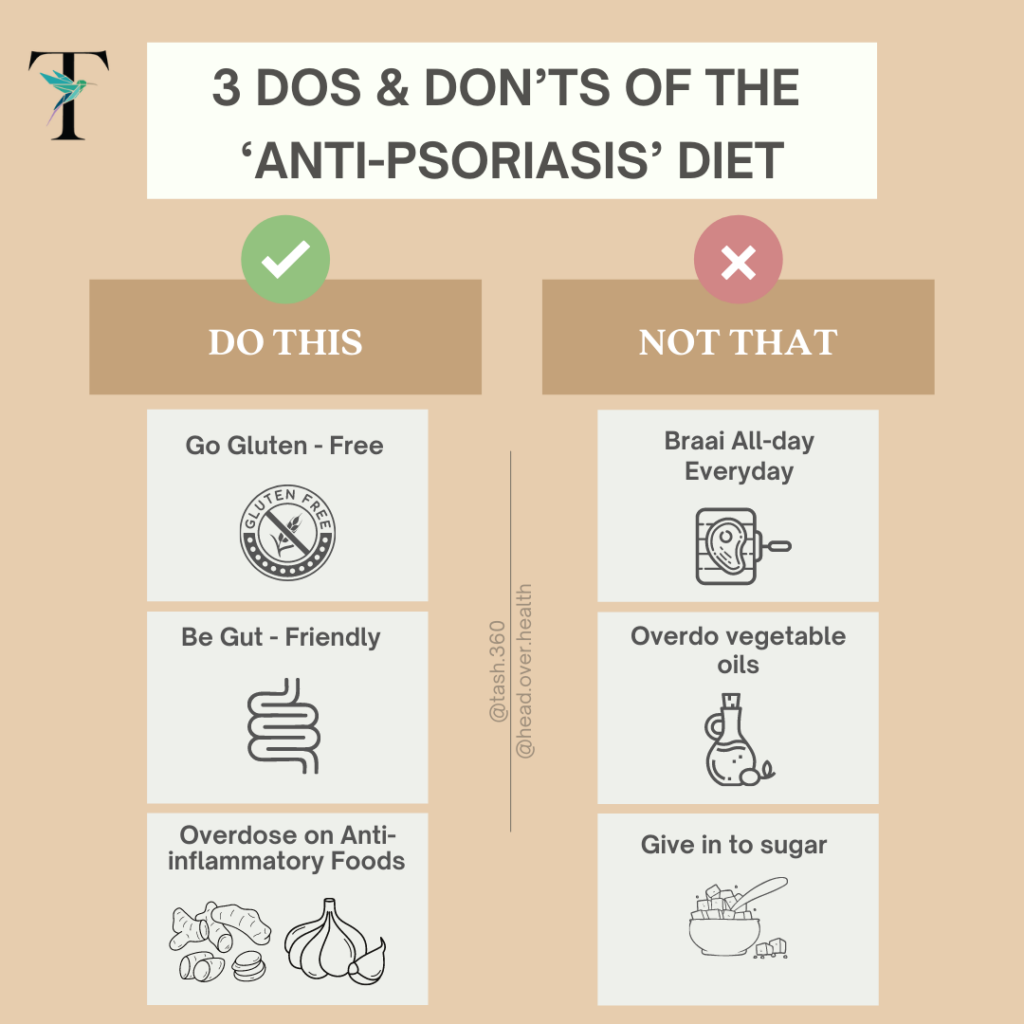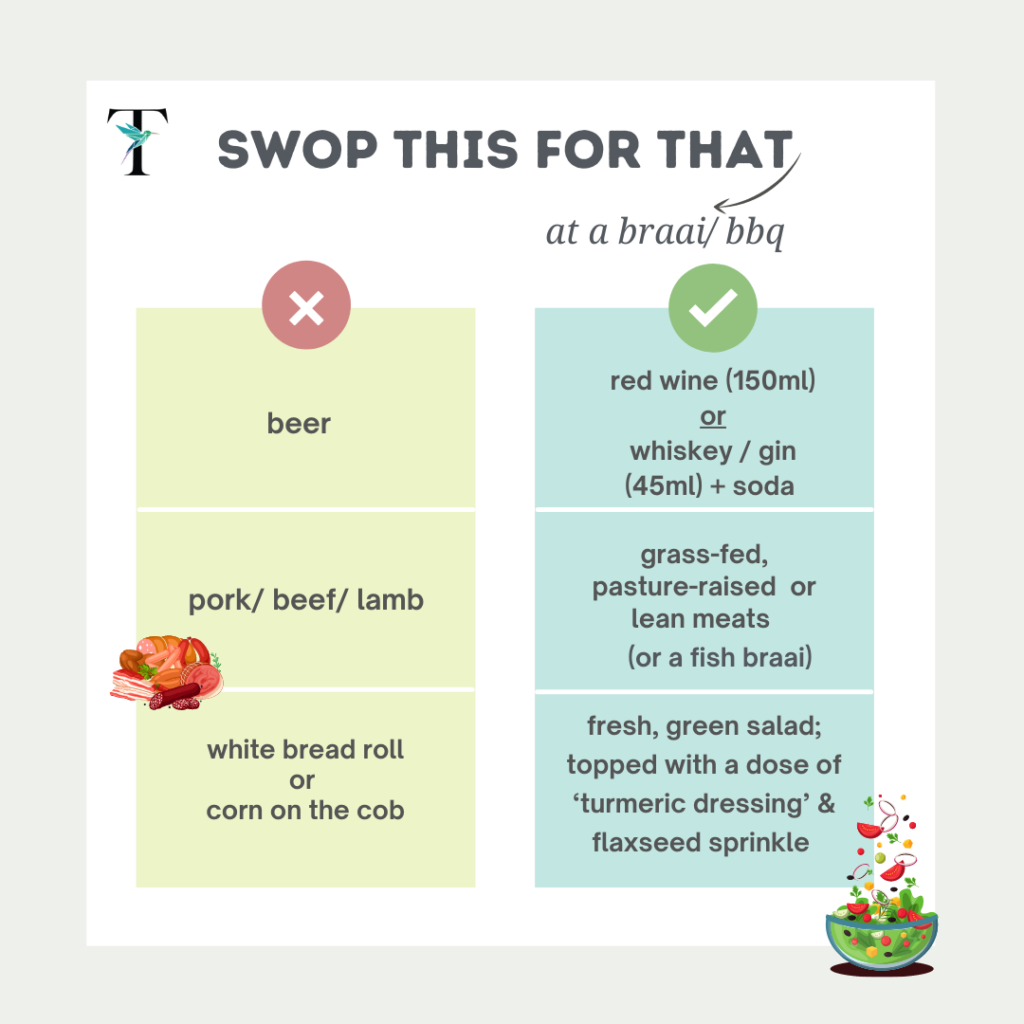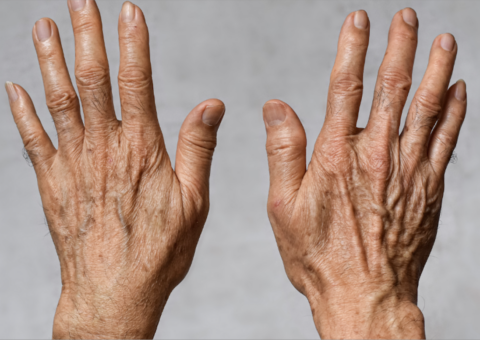
Before stepping into your doctor’s room, there’s one thing that you should know: psoriasis is not just a ‘skin thing’. Psoriatic disease is associated with systemic inflammation (an inflammatory response throughout the body), and occurs when inflammatory signals (produced by your immune system) infiltrate into the skin; causing certain areas of your skin to produce new cells more rapidly than normal, which can lead to thickening and scaling.
3 Dos & Don’ts of the ‘Anti-Psoriasis’ Diet

Do:
![]() ‘Go Gluten-Free
‘Go Gluten-Free
For all you bread-lovin’ people out there, brace yourselves: If you’ve got psoriasis, a gluten-free diet may be for you.
Psoriasis sufferers are 2x more likely to develop coeliac disease (CD)1. CD is an autoimmune disease, in which the ingestion of gluten leads to damage of the gut wall (specifically, in the small intestine). The association between psoriasis and CD has put gluten-free diets at the forefront of nutritional therapy. In those of you with confirmed CD, you’ll know that a gluten-free diet is non-negotiable. However, even if you’re in the ‘safe zone’ (no sign of CD), you may still experience ‘gluten sensitivity’, or a non-immune mediated reaction to gluten.
![]() ‘Be Gut-Friendly‘
‘Be Gut-Friendly‘
Don’t be fooled, coeliac disease is not the only ‘gut issue’ that we’re looking out for!
Scientists have started to navigate their way into the ‘psoriatic gut microbiome’; and from preliminary studies, it’s clear that psoriasis sufferers possess a very different microbial makeup to healthier individuals2. Some have even observed significant associations between psoriasis and Inflammatory Bowel Diseases (Crohn’s Disease and Ulcerative Colitis)!3
For healthy people wanting to feed & grow their good bacterial communities; fermented foods and fibre-rich foods are the way to go. However, for those with complex gut issues or overt symptoms (such as diarrhoea, constipation, bloating, heartburn or reflux, and pain); we strongly advise that individualised, staged ‘gut healing’ interventions are implemented by your health care professional.
![]() Overdose on Anti-inflammatory Foods
Overdose on Anti-inflammatory Foods
If you don’t know by now that Omega 3 & Vitamin D are NB for skin health, then you haven’t been following the TASH360 LIFE for long enough!
Omega 3 has been shown to act against an inflammatory mediator (known as LTB4), which is elevated in psoriatic plagues. The typical western diet has an omega 6: omega 3 ratio (of 15-20:1, whereas an ratio of 1.8:1 is ideal; especially, when omega 3 fats are derived from cold-water fish.
We know that topical Vitamin D is well established as a treatment option in plaque psoriasis, although the beneficial benefit of oral supplementation is less certain. However, it is safe to say that Vitamin D deficiencies seem to be more common in patients with psoriasis, 5, and that the correction of Vitamin D deficiencies has been shown to support ‘normal’ immune function.
As with Vitamin D, selenium is known to affect the immune system, and decreased selenium levels in the blood of patients with moderate to severe psoriasis have been reported6.
So now that you’ve got 3 of many essential nutrients for psoriasis on your plate, here’s something to spice up your meals. Dose up on these ‘anti-psoriatic’ (aka anti-inflammatory) botanicals: ginger, rosemary and turmeric.
Don’ts:
![]() Braai all-day, everyday (yes, this is for you, South Africans)
Braai all-day, everyday (yes, this is for you, South Africans)
If you’ve got psoriasis, then you’ll probably know about this one. Excessive intake of alcohol, red meats, and fried vegetable oils7 are some of the worst culprits out there – not only do they cause your immune cells to release inflammatory messages, and kill off the good gut microbes; but they also impair the skin’s and gut’s barrier functions (learn more about leaky gut here). If you’re braaiing most days; then you may just be ‘cheers-ing’ to more inflamed psoriatic lesions.
![]() Overdo Vegetable Oils
Overdo Vegetable Oils
We spoke about the importance of optimising your omega 6: omega 3 ratio, right? Well, with the recent BOOM in the vegetable oil industry, alongside the increased use of cereal grains as feed for domestic livestock; we’re getting in a lot more omega 6 than we should be. Safflower, sunflower, corn and cottonseed oil are right up there on the omega 6 spectrum!
![]() Give into Sugar
Give into Sugar
The hardest of them all.
When blood sugar levels are elevated for an extended period of time, the body enters an inflammatory state, which can lead to cellular dysfunction and changes in immunity. Higher intake of refined (or ‘simple’) sugars may exacerbate psoriasis; by promoting TH17 differentiation7.
At TASH360, we’re all about using lifestyle medicine to complement medical treatment. Here, we’re not about ‘plastering up’ your symptoms; but digging deep to address root causes of skin issues. Remember, psoriasis is more than skin-deep.
Next time when you are at a braai, try and make these easy swops :

At TASH 360, we believe in personalized care. Visit our nutritionist, Steph Rouillard, to get your gut right, get your omega 6:omega 3 ratio optimised, and your internal antioxidant system in tip-top condition!








